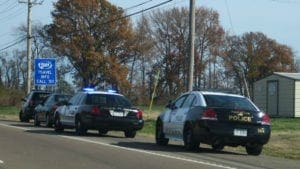Drug War: CO Residents Treated as Criminals in Neighboring States
This article was featured in our weekly newsletter, the Liberator Online. To receive it in your inbox, sign up here.
Colorado was the first state in the nation to legalize recreational marijuana. But while freer drug markets have also helped to boost other aspects of Colorado’s economy, issues associated with other state-run agencies were never fully addressed, mainly how law enforcement’s long-lasting love affair with targeting drug users and dealers hasn’t really changed.
 Ever since recreational marijuana was made legal, Tech Dirt reports, law enforcement agencies in neighboring states inched closer, considering any road coming out of Colorado a “drug corridor.”
Ever since recreational marijuana was made legal, Tech Dirt reports, law enforcement agencies in neighboring states inched closer, considering any road coming out of Colorado a “drug corridor.”
Due to this approach to drug-related law enforcement, several unconstitutional stops and seizures have been taking place at the borders surrounding Colorado.
Recently, one of the incidents in which out of state officers attempted to send innocent travelers to jail turned sour—for the Kansas police.
The Tenth Circuit Court of Appeals ruled that a traffic stop carried out in Kansas was unconstitutional because the driver involved did not commit a crime by traveling from a state where marijuana is legal. After all, Tech Dirt adds, “it isn’t against the law to conspire to perform an act that is legal in another state.”
The incident that prompted the court’s decision involves Peter Vasquez. Originally, Kansas Highway Patrol officers claimed they pulled him over because his vehicle’s temporary tag was unreadable. But moments after his tag was verified, officers launched an expedition to find out whether the Colorado resident had any illegal substances in his vehicle.
While Vasquez was in the car, one of the officers told the second agent that Vasquez was “notably nervous,” urging the officer to “get a feel for him” to see “how nervous” he was. Once the second Kansas officer returned, he allegedly said Vasquez was “scared to death.” After checking Vasquez’s insurance and noticing he had added two new cars to his policy, one of the officers assumed Vasquez had been transporting illegal drugs. That’s when the K-9 unit was called.
During a quick interrogation, officers learned Vasquez owned a boutique, and that the newer car he had bought was given to his girlfriend. Once Vasquez told the officers he was moving to Maryland, they urged the driver to disclose the location of his belongings. Vasquez answered that he had already moved most of his belongings.
After issuing Vasquez a warning, officers continued to pressure him to give them consent to search the vehicle. But the attempts were fruitless. As a result, the officers decided to consider his stand was enough to prove Vasquez had something to hide.
Because one of the officers believed Vasquez was “probably involved in a little criminal activity,” they arrested him.
Once the dog was summoned, it failed to bark at anything in the vehicle. Nevertheless, cops went further, searching the vehicle on their own anyway. They also found nothing.
After the ordeal was finally over, Vasquez sued the Kansas Highway Patrol officers over their illegal search.
In their defense, officers involved claimed that the fact Vasquez was driving alone at night in a “known drug corridor” made him a suspect of taking part in illegal drug activities. Officers also claimed that, the fact Vasquez’s back seat “did not contain items” the law enforcement duo expected to see “in the car of someone moving across the country,” and the fact he seemed nervous, where all reasons for them to arrest him.
Thankfully for Vasquez, the judge ruled the officers’ conduct unreasonable and unconstitutional.
While this is a victory for this one individual, it’s disturbing to learn that law enforcement agencies see residents of a state where marijuana is legal as “instant criminals.”
When looking for what the drug war has accomplished over the years, look no further. Officers now consider anyone from Colorado a potential suspect. Even if drugs aren’t involved. That, and that alone, is what the drug war has produced.

























